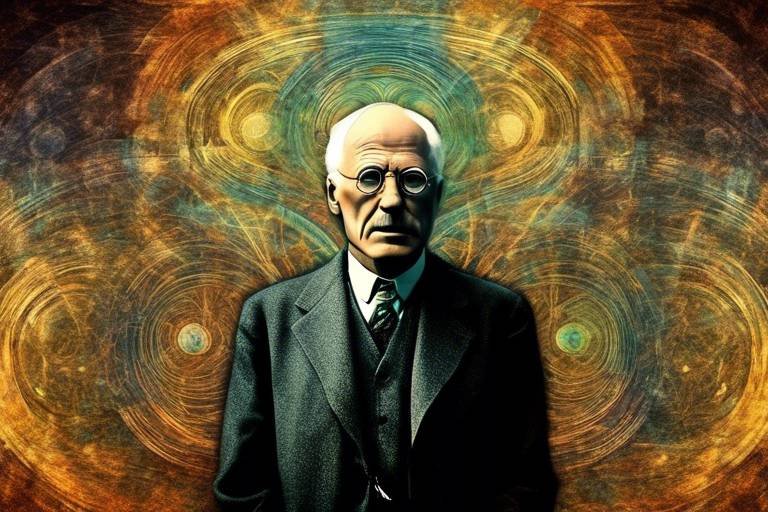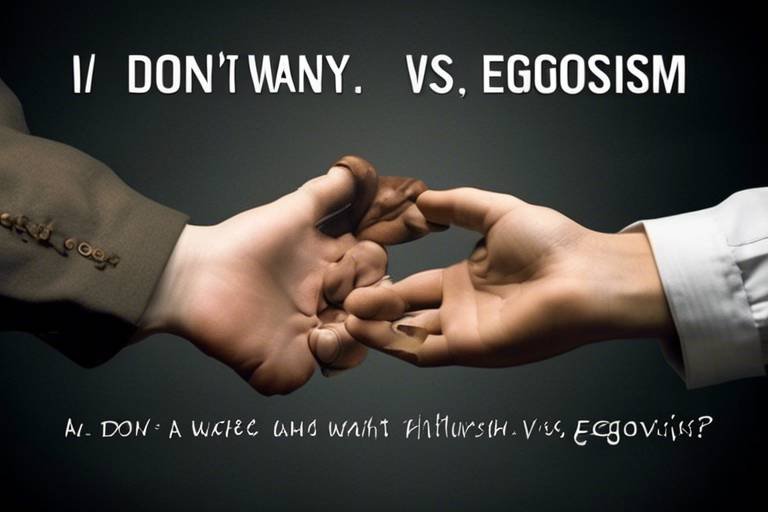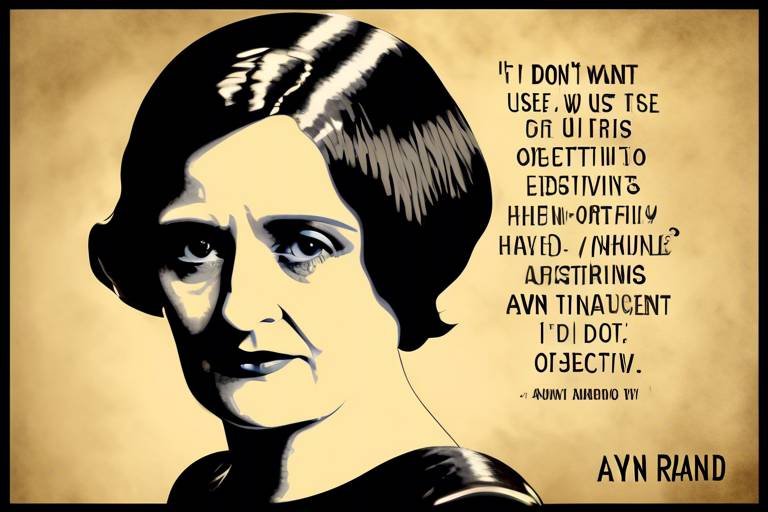Understanding the Philosophy of Absurdism
Absurdism, a fascinating philosophical perspective, dives deep into the tension between our innate human craving for meaning and the universe's apparent indifference. Picture yourself standing at the edge of a vast, empty abyss, peering into the darkness, with questions swirling in your mind like leaves caught in a whirlwind. What is the purpose of life? Why do we exist? These are the fundamental inquiries that Absurdism seeks to address. At its core, Absurdism acknowledges that life is often devoid of inherent meaning, yet it challenges us to confront this uncomfortable reality head-on.
This philosophy gained traction in the 20th century, notably influenced by existentialist thought, but it carves out its own unique identity. While existentialism grapples with the quest for meaning, Absurdism embraces the futility of that search. It encourages us to accept the absurdity of our existence and to find freedom within that acceptance. Imagine a tightrope walker balancing precariously above a vast chasm. The act of walking the tightrope represents our struggle for meaning, while the chasm symbolizes the absurdity of life. Instead of falling into despair, Absurdism invites us to dance on that tightrope, to find joy in the struggle itself.
In exploring Absurdism, we encounter a rich tapestry woven from the threads of various philosophical ideas. Think of it as a philosophical buffet, where existentialism, nihilism, and even humanism offer their unique dishes. However, Absurdism stands out as a distinct course that emphasizes the conflict between our search for meaning and the chaotic nature of the universe. It’s not about giving up; it’s about recognizing the absurd and choosing to live fully despite it. This perspective can be liberating, allowing individuals to break free from societal expectations and embrace their authentic selves.
As we delve deeper into the philosophy of Absurdism, we will uncover its historical origins, key philosophers who shaped its development, and the profound implications it holds for our lives. By understanding Absurdism, we can navigate the complexities of existence with a renewed sense of purpose and authenticity. So, are you ready to take the plunge into the absurd? Let’s embark on this philosophical journey together!
Absurdism emerged in the 20th century, influenced by existentialist thought. This section delves into its historical background and the philosophical landscape that shaped its development.
This section introduces prominent figures like Albert Camus, whose works define Absurdism. Their contributions illustrate how they articulated the struggle between human desire for meaning and the indifferent universe.
Camus's essay, The Myth of Sisyphus, serves as a cornerstone of Absurdist philosophy. This section analyzes its themes of struggle, perseverance, and acceptance of life's absurdity.
Understanding the Absurd is crucial in Absurdism. This subsection discusses the conflict between human quest for meaning and the chaotic, indifferent universe.
Camus advocates for rebellion against the Absurd. This segment examines how embracing the struggle can lead to personal freedom and authenticity.
Though related, existentialism and Absurdism differ significantly. This section compares their perspectives on meaning, existence, and individual agency.
Absurdism offers unique insights into coping with life's challenges. This section explores how embracing absurdity can lead to a more authentic and fulfilling existence.
This subsection discusses how individuals can create personal meaning despite the Absurd, fostering resilience and creativity in everyday life.
Freedom is a central tenet of Absurdism. This portion examines how recognizing life's absurdity can empower individuals to live authentically and make conscious choices.
- What is Absurdism? Absurdism is a philosophy that explores the conflict between humans' desire for meaning and the universe's indifference.
- Who is the main philosopher associated with Absurdism? Albert Camus is the most prominent figure associated with Absurdism, particularly known for his essay The Myth of Sisyphus.
- How does Absurdism differ from existentialism? While both philosophies deal with meaning, Absurdism embraces the futility of the search for meaning, whereas existentialism seeks to create meaning in life.
- Can one find happiness in Absurdism? Yes! Absurdism encourages individuals to embrace life's absurdity, which can lead to personal freedom, authenticity, and even happiness.

The Origins of Absurdism
Absurdism, a philosophical movement that emerged in the 20th century, is often viewed as a response to the existential crises that plagued humanity during this tumultuous period. The backdrop of two World Wars, the rise of totalitarian regimes, and the disillusionment with traditional values created fertile ground for new ways of thinking about human existence. At its core, Absurdism grapples with the inherent conflict between the human desire for meaning and the chaotic, indifferent universe that seems to offer none. This struggle resonates deeply with individuals seeking purpose in a world that often feels devoid of it.
To truly appreciate the origins of Absurdism, one must consider its relationship with existentialism, a philosophical movement that gained traction in the early 20th century. While existentialists like Jean-Paul Sartre and Simone de Beauvoir focused on individual freedom and the creation of personal meaning, Absurdists like Albert Camus took a different route. They acknowledged that the search for meaning is often met with an absurd reality, leading to a confrontation with the limits of human understanding. This philosophical divergence is crucial for grasping how Absurdism emerged as a distinct school of thought.
Key historical events and cultural shifts also played a significant role in shaping Absurdism. The existential angst resulting from the horrors of war and the subsequent questioning of established norms prompted thinkers to explore the absurd nature of existence. In this environment, the absurd was not merely a philosophical concept but a lived experience. The following factors contributed to the development of Absurdism:
- The Influence of World Wars: The devastation and loss of life led many to question the meaning of existence.
- Scientific Advancements: The rise of scientific rationalism challenged traditional religious and philosophical beliefs.
- Literary Movements: The absurdist themes in literature, particularly in the works of Samuel Beckett and Eugène Ionesco, highlighted the irrationality of human existence.
In summary, Absurdism emerged as a philosophical response to the complexities of the modern world. It reflects a profound understanding of the human condition, where individuals are left to navigate a universe that offers no clear answers. This struggle is not just an intellectual exercise but a deeply personal journey that resonates with anyone who has ever pondered their place in an incomprehensible world. As we delve deeper into the key figures who shaped Absurdism, we will uncover how their insights continue to influence our understanding of life and existence today.

Key Philosophers of Absurdism
Absurdism, a philosophy that grapples with the tension between humanity's search for meaning and the universe's apparent indifference, has been shaped by a handful of influential thinkers. Among these, Albert Camus stands out as the most prominent figure, whose works not only define Absurdism but also challenge us to confront the inherent contradictions of our existence. In exploring the ideas of these key philosophers, we uncover a rich tapestry of thought that invites us to question our place in the world.
Camus's philosophy was deeply influenced by the existentialist movement, yet he diverged significantly in his conclusions. While existentialists like Jean-Paul Sartre emphasized the individual's role in creating meaning, Camus posited that the search for meaning itself is absurd. This perspective is beautifully encapsulated in his famous assertion: "The struggle itself toward the heights is enough to fill a man's heart. One must imagine Sisyphus happy." Here, Camus invites us to embrace the struggle against the absurd rather than succumb to despair.
Another key figure in the development of Absurdist thought is Franz Kafka. Although Kafka is often associated with existentialism, his works resonate deeply with Absurdist themes. In stories like The Metamorphosis, Kafka explores the alienation and absurdity of human existence, illustrating how individuals can find themselves trapped in incomprehensible situations. His characters often grapple with a reality that seems arbitrary and chaotic, reflecting the absurd nature of life itself.
Furthermore, we cannot overlook the contributions of Samuel Beckett, whose plays, particularly Waiting for Godot, embody the essence of Absurdism. Beckett's characters are caught in a perpetual state of waiting, highlighting the futility of their existence. Through their dialogues, Beckett reveals the absurdity of human life, where meaning is elusive, yet the act of waiting becomes a form of existence in itself.
To better understand these philosophers and their contributions to Absurdism, we can summarize their key ideas in the following table:
| Philosopher | Key Contributions |
|---|---|
| Albert Camus | Defined Absurdism, emphasized the struggle against the absurd, and articulated the concept of finding happiness in the struggle. |
| Franz Kafka | Explored themes of alienation and incomprehensibility in human existence, reflecting the absurd nature of life. |
| Samuel Beckett | Highlighted the futility of existence through characters caught in a cycle of waiting, illustrating the absurdity of human life. |
These philosophers, through their profound insights, have shaped our understanding of Absurdism, urging us to confront the chaos of existence with courage and resilience. By embracing the absurd, we are not merely resigning ourselves to a meaningless life; rather, we are choosing to find freedom and authenticity in our struggle. As we navigate through the absurdity of life, we can draw inspiration from their works, finding solace in the shared human experience of grappling with the unknown.
- What is Absurdism? Absurdism is a philosophical perspective that emphasizes the conflict between human beings' quest for meaning and the indifferent, chaotic universe.
- Who are the key philosophers associated with Absurdism? The most notable philosophers include Albert Camus, Franz Kafka, and Samuel Beckett, each contributing unique insights to the philosophy.
- How does Absurdism differ from existentialism? While both philosophies explore the search for meaning, Absurdism asserts that the quest itself is futile, whereas existentialism focuses on the individual's role in creating meaning.
- What is the significance of Camus's "The Myth of Sisyphus"? This essay illustrates the idea that one can find happiness in the struggle against the absurd, suggesting that the journey itself can be fulfilling.

Albert Camus and The Myth of Sisyphus
When we dive into the realm of Absurdism, we can't overlook the monumental influence of Albert Camus. His essay, The Myth of Sisyphus, is not just a philosophical text; it’s a profound exploration of the human condition. Imagine Sisyphus, a figure from Greek mythology, condemned to roll a boulder up a hill only for it to roll back down each time he reaches the top. This endless cycle of labor and futility encapsulates the essence of life as Camus sees it. In this essay, he poses a crucial question: How do we find meaning in a world that seems indifferent to our struggles?
Camus argues that the absurd arises from the clash between our inherent desire for significance and the universe's silence. This struggle is not just a philosophical musing; it reflects our daily lives. We often chase dreams, seek answers, and long for connection, yet the reality is that life can feel chaotic and devoid of purpose. The beauty of Camus's philosophy lies in his acceptance of this absurdity. Instead of succumbing to despair, he suggests that we can choose to embrace our situation. This acceptance leads to a form of freedom, where individuals can live authentically despite the lack of inherent meaning.
One of the most striking elements of The Myth of Sisyphus is Camus's idea of revolt. He posits that acknowledging the absurdity of life is the first step towards liberation. By recognizing that our struggles are ultimately futile yet continuing to push our boulders uphill, we assert our existence. This act of rebellion against the absurd is what grants us a sense of purpose. Camus famously concludes that “one must imagine Sisyphus happy.” In this statement, he encapsulates the essence of human resilience and the capacity to find joy in the struggle itself.
Through Sisyphus, Camus teaches us that life is not about reaching a destination but about the journey itself. It’s about the moments we create and the experiences we cherish, even when they seem insignificant in the grand scheme of things. The key takeaway here is that while the universe may not offer us answers, we have the power to create our own meaning. This perspective encourages us to embrace life’s challenges, to push our boulders, and to find fulfillment in the act of living.
In summary, Camus's The Myth of Sisyphus serves as a cornerstone of Absurdist thought, providing profound insights into the human experience. It challenges us to confront the absurdity of existence and to find meaning within the struggle. So, the next time you feel overwhelmed by life's relentless challenges, remember Sisyphus and his eternal task. Embrace your own absurdity, and perhaps, like him, you too can find happiness in the journey.
- What is Absurdism? Absurdism is a philosophical perspective that explores the conflict between humans' desire for meaning and the chaotic, indifferent universe.
- Who is Albert Camus? Albert Camus was a French philosopher and writer known for his contributions to Absurdism, particularly through his essay, The Myth of Sisyphus.
- What does Sisyphus symbolize in Camus's philosophy? Sisyphus symbolizes the human struggle against the absurdity of life, representing the persistence to find meaning despite knowing it may be unattainable.

The Myth of Sisyphus,
This article explores the core concepts of Absurdism, its historical context, key philosophers, and its implications for human existence, providing insights into how individuals navigate life's inherent meaninglessness.
Absurdism emerged in the 20th century, influenced by existentialist thought. This section delves into its historical background and the philosophical landscape that shaped its development.
This section introduces prominent figures like Albert Camus, whose works define Absurdism. Their contributions illustrate how they articulated the struggle between human desire for meaning and the indifferent universe.
Camus's essay, The Myth of Sisyphus, serves as a cornerstone of Absurdist philosophy. In this profound work, Camus presents the tale of Sisyphus, a figure from Greek mythology condemned to roll a boulder up a hill only for it to roll back down each time he reaches the summit. This endless cycle of labor encapsulates the essence of human struggle in a world devoid of inherent meaning. Camus uses Sisyphus as a metaphor for the human condition, illustrating how we too are caught in a relentless pursuit of purpose, often facing the futility of our efforts. Yet, rather than succumbing to despair, Camus argues that we must embrace our absurd existence with open arms. He famously concludes that “one must imagine Sisyphus happy,” suggesting that the act of rebellion against the absurdity of life can lead to a sense of fulfillment.
Understanding the Absurd is crucial in Absurdism. The conflict between humanity's quest for meaning and the chaotic, indifferent universe creates a tension that is at the heart of the Absurd. This realization can be unsettling, as it confronts our innate desire for clarity and purpose. However, it also opens the door to a new perspective on life. By acknowledging the Absurd, individuals can begin to explore their own values and beliefs, crafting a personal narrative that defies the void. This journey is not about finding definitive answers but rather embracing the questions that life throws our way.
Camus advocates for rebellion against the Absurd. This rebellion is not a physical uprising but a profound internal awakening. By acknowledging the absurdity of existence, individuals can reclaim their freedom and authenticity. This segment examines how embracing the struggle can lead to personal freedom and authenticity. It is in this revolt that we find our strength; by choosing to continue pushing our boulders up the hill, we assert our existence and define our own meaning. The act of living authentically, despite the chaos, becomes a powerful statement of resilience.
Though related, existentialism and Absurdism differ significantly. This section compares their perspectives on meaning, existence, and individual agency.
Absurdism offers unique insights into coping with life's challenges. This section explores how embracing absurdity can lead to a more authentic and fulfilling existence.
This subsection discusses how individuals can create personal meaning despite the Absurd, fostering resilience and creativity in everyday life.
Freedom is a central tenet of Absurdism. This portion examines how recognizing life's absurdity can empower individuals to live authentically and make conscious choices.
- What is Absurdism? Absurdism is a philosophical perspective that highlights the conflict between humans' search for meaning and the indifferent universe that offers none.
- Who is the main philosopher associated with Absurdism? Albert Camus is the most prominent figure associated with Absurdism, particularly through his essay, The Myth of Sisyphus.
- How does Absurdism differ from existentialism? While both philosophies address the search for meaning, Absurdism emphasizes the futility of this search in an indifferent universe, whereas existentialism often focuses on individual agency and the creation of meaning.
- Can embracing Absurdism lead to a fulfilling life? Yes! By accepting the absurdity of life, individuals can find personal meaning and live authentically, leading to a more fulfilling existence.

serves as a cornerstone of Absurdist philosophy. This section analyzes its themes of struggle, perseverance, and acceptance of life's absurdity.
At the heart of Absurdism lies Albert Camus's seminal essay, The Myth of Sisyphus, which serves as a cornerstone of Absurdist philosophy. In this profound work, Camus presents the image of Sisyphus, a figure from Greek mythology condemned to roll a boulder up a hill only for it to roll back down each time he reaches the top. This relentless cycle is a powerful metaphor for the human condition, illustrating the struggle against the inherent meaninglessness of life. Camus invites us to ponder: if life is absurd, how should we respond to it? Should we succumb to despair, or can we find a way to embrace our plight?
Camus argues that the act of struggle itself is what makes life worthwhile. He emphasizes that while we may never find ultimate meaning, our perseverance in the face of absurdity is a testament to our humanity. The themes of struggle and perseverance are not just philosophical musings; they resonate deeply with our everyday experiences. Think about it—how many times have you faced challenges that seemed insurmountable? Yet, it is in these moments of pushing against the odds that we often discover our true selves. Camus asserts that we must imagine Sisyphus happy, as he finds contentment in his eternal struggle.
Moreover, acceptance of life's absurdity is a crucial element in Camus's philosophy. It requires a radical shift in perspective, moving from a quest for meaning to an acknowledgment of the absurd. This acceptance does not lead to nihilism; rather, it opens the door to personal freedom. When we recognize the absurdity of our existence, we are liberated from the shackles of expectation and societal norms. We can choose to live authentically, creating our paths and defining our meanings, however fleeting they may be.
In essence, The Myth of Sisyphus challenges us to confront the absurd head-on. Instead of retreating into despair, we are encouraged to embrace our struggles, celebrate our perseverance, and find joy in the acceptance of life's inherent absurdity. This philosophy not only empowers individuals but also fosters resilience, creativity, and a deeper appreciation for the human experience.
- What is Absurdism? Absurdism is a philosophical perspective that emphasizes the conflict between humans' desire for meaning and the indifferent universe that offers none.
- Who is the main philosopher associated with Absurdism? Albert Camus is the most prominent figure associated with Absurdism, particularly known for his work The Myth of Sisyphus.
- How does Absurdism differ from existentialism? While both philosophies explore the search for meaning, Absurdism focuses on the acceptance of life's absurdity, whereas existentialism often emphasizes the individual's freedom to create meaning.
- Can Absurdism lead to a fulfilled life? Yes, by embracing absurdity and recognizing the freedom it brings, individuals can live authentically and create personal meaning in their lives.

The Notion of the Absurd
At the heart of Absurdism lies the concept of the **Absurd**, a term that encapsulates the conflict between our innate desire for meaning and the **indifferent universe** that often seems to mock our search for significance. Imagine standing at the edge of a vast ocean, gazing out at the horizon, where the sun meets the water. You feel a deep longing to understand the depths of that ocean, yet you realize that it is beyond your grasp. This metaphor beautifully illustrates the **human condition**: we yearn for clarity and purpose, but the universe remains silent, leaving us to navigate through the chaos.
The Absurd arises from this dissonance. It's not just about the feeling of meaninglessness; it’s about recognizing that our quest for meaning is met with an **unresponsive reality**. Think about it—every day, we wake up with aspirations, dreams, and plans. Yet, life has a way of throwing unexpected challenges our way. The more we strive to impose order and significance, the more we confront the **chaotic nature** of existence. This realization can be both liberating and terrifying. It forces us to confront the uncomfortable truth: that perhaps, life is inherently devoid of objective meaning.
Furthermore, the Absurd does not imply despair or hopelessness. Instead, it invites us to embrace our condition and find **freedom** within it. In this light, the Absurd can be viewed as a blank canvas upon which we can paint our own meanings. Just as an artist takes a brush to a white canvas, we too can create our own narratives and purposes, even amidst the chaos. This is where the beauty of Absurdism shines; it teaches us that while the universe may be indifferent, we hold the power to define our own existence.
To better understand the nuances of the Absurd, let’s break it down into a few key aspects:
- The Conflict: The struggle between our desire for meaning and the universe's silence.
- The Acceptance: Acknowledging the Absurd leads to personal freedom.
- The Creation: We can create our own meaning in a seemingly meaningless world.
In summary, the **Notion of the Absurd** is not merely a philosophical concept; it is a profound reflection of our daily lives. It challenges us to confront the uncomfortable truths of existence while simultaneously empowering us to carve our own paths. By embracing the Absurd, we can find a sense of **authenticity** and resilience that enriches our experiences, allowing us to thrive in a world that often feels chaotic and indifferent.
- What is Absurdism? Absurdism is a philosophical perspective that emphasizes the conflict between the human desire for meaning and the chaotic, indifferent nature of the universe.
- Who is the key philosopher associated with Absurdism? Albert Camus is the most prominent figure associated with Absurdism, particularly through his essay "The Myth of Sisyphus."
- How can one find meaning in an absurd world? Individuals can create personal meaning by embracing the Absurd, acknowledging life's chaos, and actively defining their own purposes.
- Is Absurdism the same as nihilism? No, while both philosophies address meaninglessness, Absurdism encourages the creation of personal meaning, whereas nihilism often leads to despair and the rejection of meaning altogether.

Revolt Against the Absurd
In the heart of Absurdism lies a powerful call to action: the . This concept, championed by Albert Camus, suggests that while life may be devoid of inherent meaning, we possess the extraordinary ability to resist despair and embrace our freedom. Imagine standing in the middle of a vast, chaotic storm—winds howling, rain pouring down—and instead of succumbing to fear, you choose to dance. This metaphor encapsulates Camus's vision of rebellion against the absurdity of existence.
Camus argues that the recognition of life's absurdity does not lead to nihilism; rather, it opens up a pathway to genuine personal freedom. By acknowledging the absurd, we can confront our reality with courage and authenticity. This rebellion is not about futile attempts to impose meaning on a meaningless world; it’s about embracing our struggle and finding joy in the act of living itself. Just as Sisyphus rolls his boulder up the hill, we too can find purpose in our daily endeavors, no matter how repetitive or Sisyphean they may seem.
Through this lens, the act of revolt becomes a profound expression of our humanity. It’s about making conscious choices, asserting our individuality, and living authentically in a world that often feels indifferent. Camus asserts that we should not seek solace in false hopes or illusions, but instead, we should acknowledge our plight and find strength in our defiance. By doing so, we transform our struggle into a source of empowerment.
To illustrate this concept further, consider the following points:
- Acceptance of Absurdity: Embracing the absurd allows us to confront our fears and uncertainties head-on, rather than running from them.
- Creation of Personal Meaning: In the absence of universal meaning, we are free to create our own values and purpose.
- Authentic Living: By revolting against the absurd, we live more authentically, making choices that resonate with our true selves.
The revolt against the absurd is not a one-time action but a continuous journey. It requires persistent effort and a willingness to engage with life's challenges. Just as Sisyphus finds solace in his struggle, we too can discover a profound sense of fulfillment in our own battles. This rebellion is a celebration of life itself—a declaration that despite the chaos, we choose to exist fully and passionately. In this way, the absurd becomes not a source of despair, but a canvas upon which we can paint our unique stories.
1. What is the main idea behind the revolt against the absurd?
The revolt against the absurd is about embracing life’s inherent meaninglessness and finding personal freedom and authenticity through that acceptance.
2. How does this concept relate to personal freedom?
By recognizing the absurd, individuals can make conscious choices, create their own meaning, and live authentically, rather than being constrained by societal expectations.
3. Can embracing absurdity lead to a fulfilling life?
Yes! By accepting the absurdity of existence, individuals can find joy and purpose in their struggles, leading to a more authentic and fulfilling life.

Existentialism vs. Absurdism
When we delve into the realms of philosophy, two names often pop up: Existentialism and Absurdism. At first glance, they might seem like two sides of the same coin, but scratch the surface, and you'll find they diverge in significant ways. Both schools of thought grapple with the human condition, but they approach the quest for meaning from different angles. While existentialists like Jean-Paul Sartre argue that individuals can create their own meaning in a seemingly indifferent universe, Absurdists, led by thinkers like Albert Camus, suggest that the search for meaning is inherently futile, and that this realization is key to living authentically.
Existentialism posits that life is devoid of inherent meaning, but it emphasizes the power of human agency. According to existentialists, we are free to define our essence through our choices and actions. This freedom can be both exhilarating and terrifying. Imagine standing at a crossroads with endless paths ahead; the pressure to choose can feel overwhelming. Existentialists encourage individuals to embrace this freedom and take responsibility for their decisions, crafting a personal narrative that gives their life significance.
On the other hand, Absurdism introduces the concept of the Absurd, which arises from the clash between our desire for meaning and the universe’s silence. Camus famously illustrated this struggle through the myth of Sisyphus, a figure condemned to roll a boulder up a hill only to watch it roll back down for eternity. This image encapsulates the Absurdist perspective: life may seem pointless, but it is in the very act of struggling that we find our humanity. In essence, while existentialists encourage us to fight for meaning, Absurdists suggest that we find freedom in acknowledging the futility of that fight.
To further illustrate the differences, consider the following table:
| Aspect | Existentialism | Absurdism |
|---|---|---|
| Core Idea | Creation of personal meaning | Acceptance of life's inherent meaninglessness |
| Human Agency | Emphasizes individual freedom and responsibility | Recognizes limitations of human understanding |
| Response to Meaninglessness | Strive to create meaning | Revolt against the Absurd |
| Ultimate Goal | Authentic existence through choices | Finding freedom in acceptance |
In summary, while both existentialism and Absurdism acknowledge life's lack of inherent meaning, they diverge in their responses to this realization. Existentialism champions the idea of creating meaning through choice, while Absurdism encourages embracing the struggle itself, finding liberation in acceptance. This philosophical debate invites us to reflect on our own lives: do we seek to impose meaning on our existence, or do we find joy in the absurdity of it all? Ultimately, the choice is ours, and therein lies the beauty of human experience.
- What is the main difference between existentialism and absurdism? Existentialism focuses on creating personal meaning, while absurdism emphasizes accepting life's inherent meaninglessness.
- Who are the key figures in absurdism? Albert Camus is the most prominent figure associated with absurdism, particularly through his work "The Myth of Sisyphus."
- Can absurdism lead to a fulfilling life? Yes, by embracing the absurd, individuals can find freedom and authenticity, leading to a more fulfilling existence.

Implications of Absurdism on Life
Absurdism, with its stark recognition of life's inherent meaninglessness, offers a refreshing perspective on how we navigate our existence. Rather than succumbing to despair, Absurdism encourages us to embrace the chaos and uncertainty of life. This philosophy isn't just a theoretical exercise; it has profound implications for our daily lives and how we approach our struggles. Imagine standing in the middle of a bustling city, surrounded by noise and confusion, yet finding a sense of peace within that chaos. This is the essence of Absurdism—finding clarity amid the tumult.
One of the most significant implications of Absurdism is the idea of creating personal meaning. In a universe that offers no inherent purpose, we are liberated to forge our own paths. Think of it as being an artist with a blank canvas; the absence of pre-defined shapes and colors allows for limitless creativity. Individuals can actively construct their own narratives and values, leading to an authentic existence. This process of self-creation fosters resilience, as it empowers us to face life's challenges head-on without relying on external validations.
Furthermore, embracing the principles of Absurdism can lead to a deeper understanding of freedom. When we acknowledge that life is absurd, we become aware of the choices we can make. This realization can be both exhilarating and terrifying. It's like standing on the edge of a diving board—there's fear, but there's also the thrill of the jump. By recognizing the absurdity of our situation, we can break free from societal expectations and live more authentically. We are no longer bound by the need to conform to external standards of success or happiness.
In practical terms, this philosophy can reshape our approach to challenges. When faced with adversity, instead of asking, "Why is this happening to me?" we might shift our perspective to, "What can I learn from this?" This shift not only fosters resilience but also encourages a proactive stance towards life's hurdles. By accepting the absurd, we can cultivate a sense of humor about our struggles, viewing them as part of the human experience rather than as insurmountable obstacles.
To illustrate the implications of Absurdism further, consider the following table that summarizes key aspects:
| Aspect | Implication |
|---|---|
| Personal Meaning | Individuals create their own purpose and values. |
| Freedom | Recognizing absurdity empowers authentic living. |
| Resilience | Shifting perspectives fosters a proactive approach to challenges. |
| Humor | Finding humor in struggles enhances the human experience. |
Ultimately, Absurdism teaches us that while life may lack inherent meaning, it is within our power to create significance. By embracing absurdity, we cultivate a mindset that not only accepts the chaos but thrives within it. This philosophy encourages us to live fully, to laugh in the face of despair, and to find joy in the journey itself. Life, after all, is not just about the destination; it's about how we navigate the winding roads along the way.
- What is Absurdism? Absurdism is a philosophical perspective that recognizes the conflict between humans' desire for meaning and the indifferent universe.
- How does Absurdism differ from existentialism? While both philosophies address the search for meaning, Absurdism emphasizes the acceptance of life's meaninglessness, whereas existentialism often focuses on creating meaning.
- Can Absurdism lead to a fulfilling life? Yes! By embracing the absurd, individuals can create their own meaning and live authentically, leading to a more fulfilling existence.
- How can I apply Absurdism in my daily life? You can apply Absurdism by recognizing the absurdity in everyday situations, creating personal meaning, and embracing freedom in your choices.

Finding Meaning in Meaninglessness
In a world that often feels chaotic and devoid of purpose, the idea of can seem like a paradox. However, this concept is at the heart of Absurdism, inviting us to explore how we can create our own significance in an indifferent universe. Imagine standing on the edge of a vast, empty desert; the horizon stretches endlessly before you, and yet, amidst the desolation, there lies a profound opportunity to discover personal meaning. This journey isn't about uncovering some grand universal truth but rather about embracing the freedom to define our own existence.
One of the most empowering aspects of Absurdism is the realization that while the universe may not provide inherent meaning, we possess the ability to craft our own narratives. This process requires a deep level of introspection and creativity. For instance, consider how individuals often turn to various passions, relationships, or pursuits as a means of creating meaning in their lives. Whether it's through art, music, or even the simple joys of everyday interactions, these experiences can serve as a canvas upon which we paint our personal stories.
Moreover, embracing the Absurd encourages resilience. When faced with life's inherent unpredictability, we can choose to respond with creativity and determination. This might involve setting personal goals, engaging in community service, or even just cultivating a sense of gratitude for the small things. Each action, no matter how trivial it seems, contributes to a larger tapestry of meaning that we weave throughout our lives. It’s about finding joy in the journey, rather than fixating on a distant destination.
To illustrate this further, let’s consider a few ways individuals can find meaning in their lives despite the Absurd:
- Engagement in Creative Pursuits: Many find solace and purpose in expressing themselves through art, writing, or music, allowing them to channel their feelings and experiences into something tangible.
- Building Relationships: Forming connections with others can provide a sense of belonging and shared purpose, reminding us that we are not alone in our existential struggles.
- Mindfulness and Presence: Practicing mindfulness can help individuals appreciate the present moment, finding significance in the here and now rather than worrying about the future.
Ultimately, finding meaning in meaninglessness is less about discovering a definitive answer and more about embracing the questions. It's about understanding that life is a series of choices, and each choice we make can be infused with our unique values and beliefs. By cultivating a sense of agency in our lives, we can navigate through the chaos with a spirit of exploration and adventure.
In conclusion, the journey of finding meaning amidst absurdity is a deeply personal one, marked by the choices we make and the connections we forge. It's a reminder that while the universe may seem indifferent, our lives can be rich with purpose, creativity, and authenticity. So, the next time you feel overwhelmed by life's uncertainties, remember that within the absurd lies the potential for profound meaning—crafted by none other than yourself.
1. What is Absurdism?
Absurdism is a philosophical perspective that emphasizes the conflict between humans’ desire for meaning and the indifferent universe. It suggests that while life may seem meaningless, individuals can create their own significance.
2. How can I find meaning in my life?
You can find meaning by engaging in creative pursuits, building relationships, and practicing mindfulness. It's about making conscious choices that resonate with your values.
3. Is Absurdism similar to existentialism?
While both philosophies explore themes of meaning and existence, Absurdism specifically addresses the conflict between human desire for meaning and the universe's indifference, whereas existentialism focuses more on individual freedom and choice.
4. Can embracing the Absurd lead to personal freedom?
Yes! By acknowledging the Absurd, individuals can break free from societal expectations and live authentically, making choices that reflect their true selves.

The Role of Freedom in Absurdism
In the intricate tapestry of Absurdism, the concept of freedom emerges as a powerful thread, weaving through the fabric of human existence. When we confront the absurd—this chaotic, indifferent universe that seems to mock our quest for meaning—we are often left feeling trapped, as if we’re characters in a play with no script. Yet, paradoxically, it is within this very absurdity that we find the seeds of our freedom. How can something so seemingly bleak offer us liberation? It's a question worth pondering.
Albert Camus, the prominent figure in Absurdist philosophy, posits that recognizing the absurdity of our condition is the first step towards true freedom. This recognition allows us to break free from the shackles of imposed meanings and societal expectations. Instead of being weighed down by the burden of searching for an ultimate purpose, we can embrace our freedom to create our own meaning. In this sense, freedom is not merely the absence of constraints; it is the ability to choose how we respond to the absurdity of life.
Imagine life as a vast, open field, where the rules of the game are constantly shifting. In this field, you can choose your path, even if the destination remains uncertain. This is the essence of freedom in Absurdism: the power to navigate through life's uncertainties with a sense of agency. Camus invites us to revolt against the absurd, not in a futile attempt to escape it, but as an act of defiance that affirms our existence. By embracing the struggle, we reclaim our freedom and authenticity.
Moreover, this newfound freedom encourages us to live fully in the present moment. Instead of fixating on the past or worrying about the future, we can immerse ourselves in the here and now. This approach fosters a sense of joy and appreciation for life, even when it feels absurd. It’s about finding beauty in the mundane and recognizing that every moment, no matter how trivial, holds the potential for significance.
To illustrate the role of freedom in Absurdism, let’s consider a few key aspects:
- Personal Agency: Freedom empowers individuals to make choices that reflect their true selves, rather than conforming to external pressures.
- Creative Expression: Embracing absurdity can lead to artistic and creative endeavors, allowing individuals to express their experiences and emotions authentically.
- Resilience: Acknowledging the absurd can foster resilience, as individuals learn to navigate challenges with a sense of agency and purpose.
In this light, the role of freedom in Absurdism is not just about escaping the absurd; it’s about engaging with it. It’s about recognizing that while we may not have control over the universe, we do have control over our reactions, our choices, and our interpretations of life’s events. This perspective transforms the absurd from a source of despair into a canvas for personal freedom and creativity.
Ultimately, embracing the absurd enables us to live authentically. We become the authors of our own narratives, crafting meaning in a world that often seems devoid of it. The freedom to choose how we respond to life’s absurdities is what allows us to flourish, to find joy, and to experience life in all its chaotic beauty.
- What is Absurdism? Absurdism is a philosophical perspective that explores the conflict between humans' desire for meaning and the indifferent universe.
- How does freedom relate to Absurdism? Freedom in Absurdism involves recognizing the absurdity of life and embracing the ability to create personal meaning and choices in the face of that absurdity.
- Can Absurdism lead to happiness? Yes, by accepting life's absurdity, individuals can find joy and authenticity in their experiences, despite the lack of inherent meaning.
Frequently Asked Questions
- What is Absurdism?
Absurdism is a philosophical perspective that explores the inherent conflict between humans' desire for meaning and the chaotic, indifferent universe. It emphasizes the struggle to find purpose in a world that seems devoid of it, suggesting that while life may be absurd, individuals can still create their own meaning.
- How did Absurdism originate?
Absurdism emerged in the 20th century, influenced primarily by existentialist thought. It developed as a response to the sense of alienation and confusion that arose in the wake of World War I and the existential crises that followed, with philosophers like Albert Camus at the forefront.
- Who are the key philosophers associated with Absurdism?
The most notable philosopher of Absurdism is Albert Camus. His works, particularly "The Myth of Sisyphus," articulate the struggle against the Absurd and the importance of personal rebellion against life's meaninglessness. Other figures, like Jean-Paul Sartre, while primarily existentialists, also intersect with Absurdist themes.
- What is the significance of "The Myth of Sisyphus"?
In "The Myth of Sisyphus," Camus uses the Greek myth of Sisyphus, who is condemned to roll a boulder up a hill only for it to roll back down, as a metaphor for human existence. The essay explores themes of struggle, perseverance, and the acceptance of life's absurdity, ultimately suggesting that one must imagine Sisyphus happy as he embraces his fate.
- How does Absurdism differ from Existentialism?
While both Absurdism and Existentialism deal with the search for meaning in a seemingly indifferent universe, they diverge in their conclusions. Existentialism often emphasizes personal freedom and responsibility in creating meaning, whereas Absurdism highlights the futility of this quest and advocates for embracing the struggle itself without the expectation of finding ultimate meaning.
- Can Absurdism provide a sense of purpose?
Yes! Absurdism encourages individuals to create their own meaning despite life's inherent absurdity. By recognizing the lack of inherent purpose, people can find freedom and authenticity in crafting their own values and goals, leading to a more fulfilling existence.
- What role does freedom play in Absurdism?
Freedom is a central tenet of Absurdism. By acknowledging the absurd nature of life, individuals can liberate themselves from societal expectations and the pressure to find predetermined meaning. This recognition empowers them to make conscious choices and live authentically, embracing their unique paths.



















